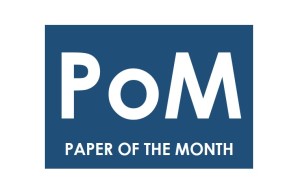Das Prodekanat für Forschung würdigt jeden Monat UKE Autorinnen und Autoren einer herausragenden Publikation, die in den vorangegangenen 2 Monaten hochrangig publiziert wurde. Ziel ist es, die am UKE enstandenen Forschungsergebnisse mit ihrer Bedeutung in der Wissenschaft einer größeren Öffentlichkeit am UKE vorzustellen. Der Aufruf zur Teilnahme richtet sich an Wissenschaftlerinnen und Wissenschaftler aller Fachgebiete. Einreichungsfrist für eine Bewerbung um die Auszeichnung des "Paper of the Month" ist jeweils Ende eines Monats (siehe Bewerbungsformular).
Das PoM-Archiv finden Sie hier:
UKE Paper of the Month January 2026
A GDF-15–GFRAL axis controls autoimmune T cell responses during neuroinflammation
Jana K. Sonner, Audrey Kahn, Lars Binkle-Ladisch, Jan Broder Engler, Beatrice Haack, Christina Zeiler, Lisa Unger, Simone Bauer, Felix Fischbach, Giovanni Almanzar, Mark Walkenhorst, Christina Mayer, Aneta Kolakowska, Sebastian Graute, Caren Ramien, Ingo Winschel, Nicola Rothammer, Markus Heine, Verena Horneffer-van der Sluis, Vincent Thiemann, Vanessa Vieira, Nina Meurs, Thomas Renné, Martina Prelog, Sebastian Beck Jørgensen, Randy J. Seeley, Anke Diemert, Petra C. Arck, Stefan M. Gold, Joerg Heeren, Jörg Wischhusen & Manuel A. Friese
ABSTRACT:
Original abstract of the paper: Inflammatory activity during multiple sclerosis (MS) often improves during pregnancy, suggesting that pregnancy-related immune adaptations affect the disease. Here we show that growth/differentiation factor-15 (GDF-15) increases during pregnancy and correlates with a reduced rate of MS relapses. GDF-15 also accumulates in the inflamed central nervous system, and its absence impairs inflammation resolution in a mouse model of MS. GDF-15 suppresses autoimmune T cell responses through an indirect signaling pathway involving the activation of GDNF family receptor α-like (GFRAL) on brainstem neurons. Therapeutic approaches, including neuronal gene delivery, recombinant GDF-15 administration and targeted chemogenetic activation of GFRAL-positive neurons induce β-adrenergic signaling and norepinephrine synthesis in the spleen, leading to decreased expression of integrins on T cells required for transmigration across the blood–brain barrier and confer protection against neuroinflammation in preclinical models of MS. These findings position GDF-15 as a crucial neuroimmune mediator and the GDF-15–GFRAL axis as promising target for MS.
STATEMENT:
Our work exemplifies how the brain can sense circulating signals of cellular stress and actively suppress immune response to protect the central nervous system from further insult.
BACKGROUND:
This work was conducted at the Institute of Neuroimmunology and Multiple Sclerosis (INIMS) under the supervision of Prof. Dr. Manuel Friese. The institute’s main interest is to dissect neuro-immune-interactions in multiple sclerosis. The study was mostly performed by Dr. Jana Sonner and Audrey Kahn as part of the CRC1713 on maternal immune activation. The project was supported by the DFG – German Research Foundation (534829736, 255154572, 405358801, 523862973), the Else Kröner-Fresenius Stiftung (EKEA.198), the Werner Otto-Stiftung (07/104), the Bundesministerium für Bildung und Forschung (01KT2310), TRANSCAN (ERA-NET– JTC 2021, iParaCyts) and the Hertie Network of Excellence in Clinical Neuroscience (P1200009).
Nature Immunology, 2026; Jan 15, doi: 10.1038/s41590-025-02406-1
Congratulations to all authors!
Next PoM: To apply, the publication must have been published in February 2026. Applications will be considered in two rounds of the selection process, i.e. two months. Please send your completed PoM application to Dr. Anne Wulf by 28/02/2026.

